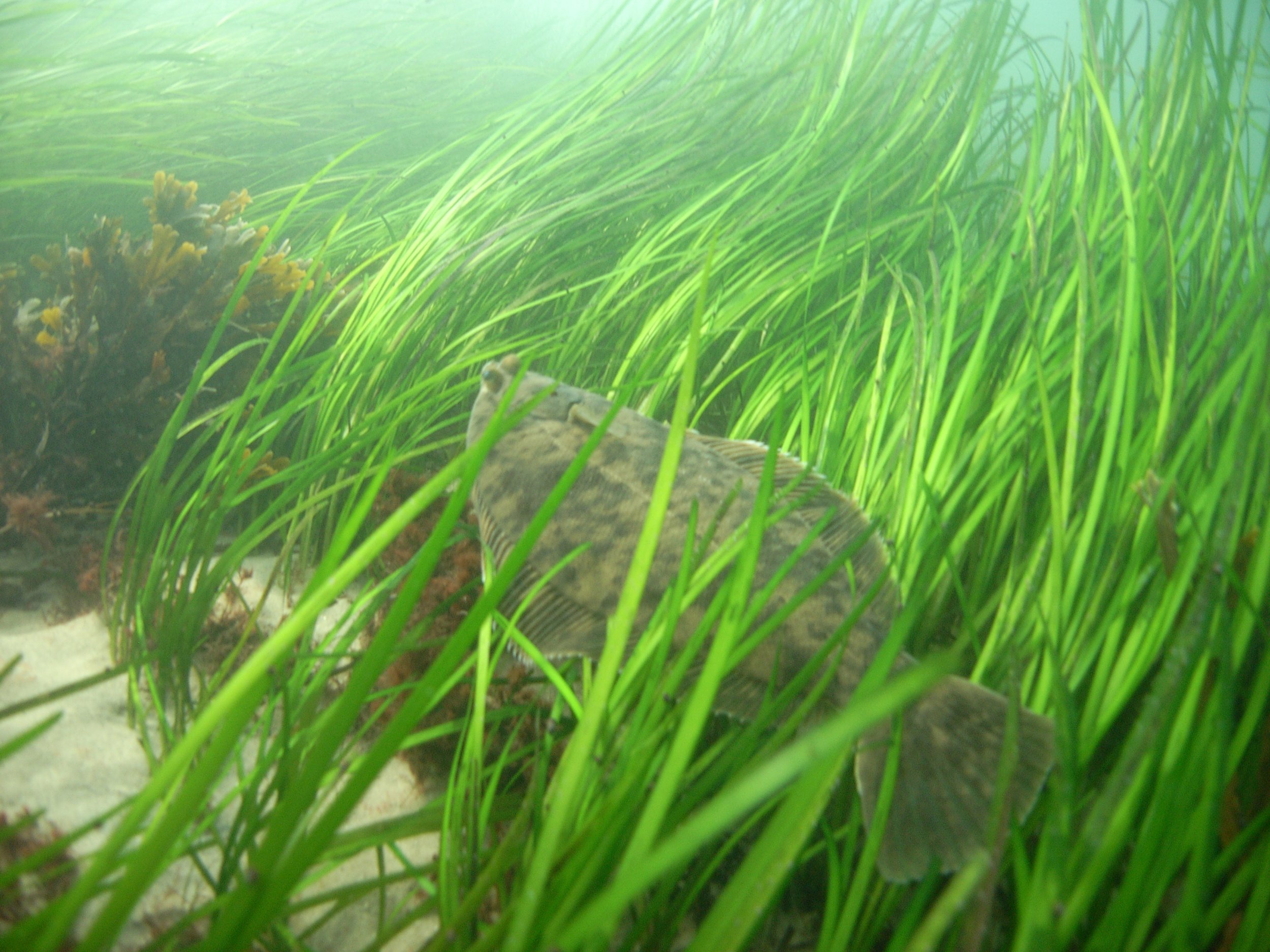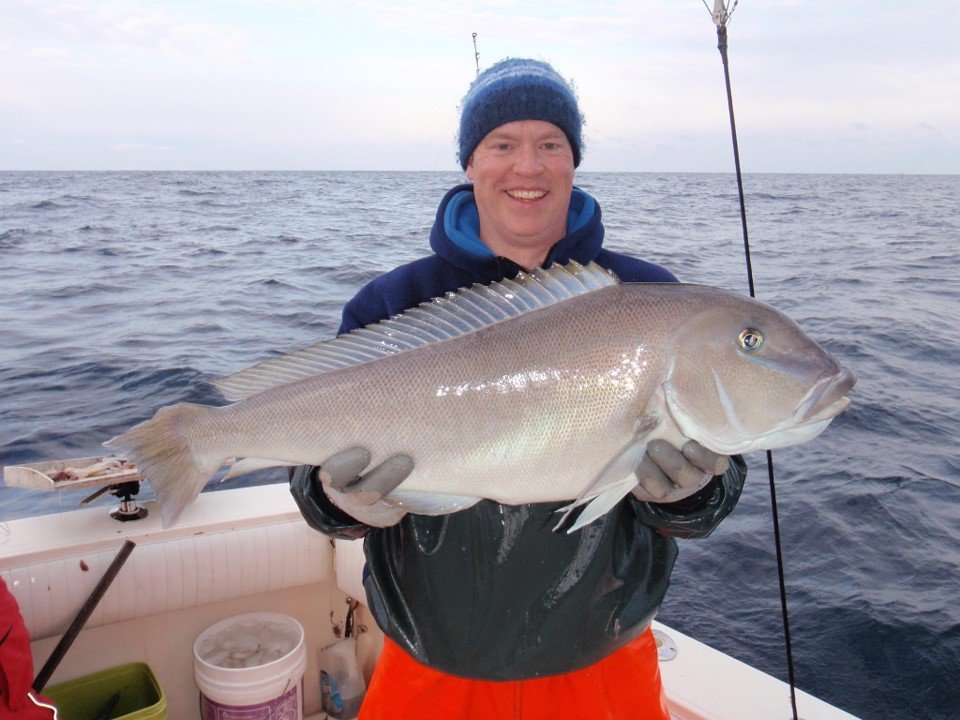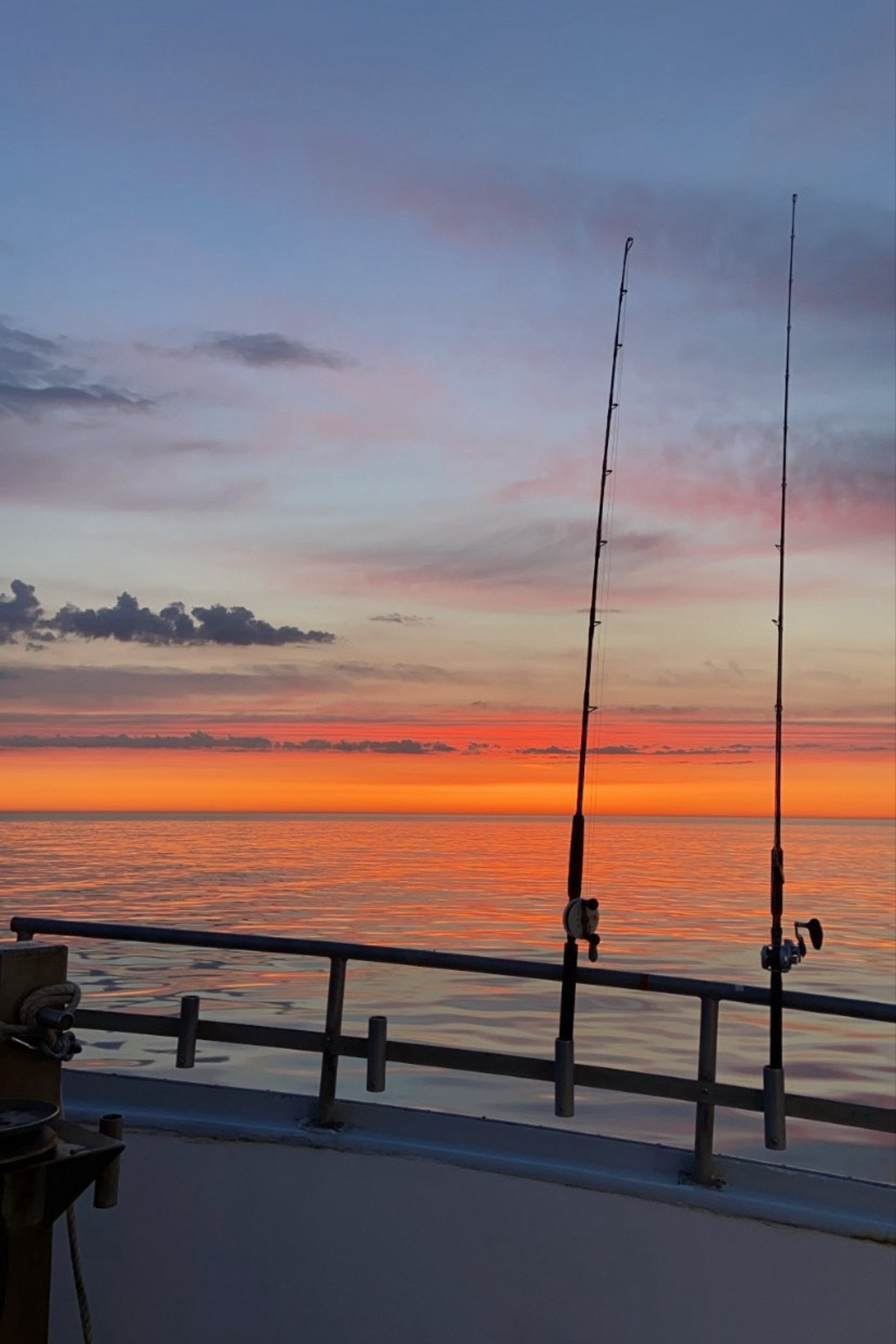The Mid-Atlantic Fishery Management Council met October 7-9, 2025, in Philadelphia, PA. The following is a summary of actions taken and issues considered during the meeting. Presentations, briefing materials, motions, and webinar recordings are available on the Council’s October 2025 meeting page. A PDF version of the meeting report is available here.
Highlights
During this meeting, the Council:
Postponed final action on the Omnibus Alternative Gear-Marking Framework until additional information is available to inform decision making
Took final action on the Spiny Dogfish Accountability Measures and 2026-2027 Specifications Framework, keeping the commercial quota nearly the same as 2025
Approved a public hearing document for the Omnibus Essential Fish Habitat Amendment
Reviewed a draft range of alternatives for the Recreational Tilefish Reporting Framework and recommended several modifications
Reviewed a draft range of alternatives for the Atlantic Mackerel Rebuilding and 2026-2027 Specifications Framework
Adopted status-quo 2026-2028 monkfish specifications and effort controls
Endorsed the monkfish provisions of the New England Council’s Management Flexibility Amendment
Received updates on habitat activities of interest in the Mid-Atlantic region
Received an update on recent Marine Recreational Information Program (MRIP) actions, including improvements to the Fishing Effort Survey
Received an update on the Atlantic Coast Regional Offshore Wind Fisheries Compensation Program
Reviewed and provided feedback on proposed actions and deliverables for the 2026 Implementation Plan (Executive Committee)
Omnibus Alternative Gear-Marking Framework
The Council met to consider taking final action on the Joint Omnibus Alternative Gear-Marking Framework. This action, which was developed in collaboration with the New England Fishery Management Council (NEFMC) and the NOAA Fisheries Greater Atlantic Regional Fisheries Office (GARFO), considers revisions to current gear marking regulations to allow for the optional use of alternative gear marking in fixed gear fisheries (i.e., trap/pot and gillnet) in the Greater Atlantic Region. This could provide increased fishing access for fishermen in areas closed to persistent buoy lines under the Atlantic Large Whale Take Reduction Plan (TRP). Currently, these persistent buoy line closures only apply to the American lobster and Jonah crab trap/pot fishery. However, future modifications to the TRP could create new persistent buoy line restricted areas for other fisheries. Revised gear-marking regulations could allow increased fishing access in the future for fixed-gear fishermen for all fisheries within the TRP restricted areas. This action would not limit the use of current gear-marking methods and would not require the use of gear-marking alternatives or on-demand gear.
After reviewing public comments and receiving an update from the Plan Development Team/Fishery Management Action Team (PDT/FMAT), the Council voted to delay final action on the framework until additional information on ropeless gear and visualization technology, as solicited through a NOAA Fisheries Request for Information (RFI), is available to better inform stakeholder input and Council decision-making. The Council’s motion to postpone final action mirrored a similar motion passed by the New England Fishery Management Council at their September 2025 meeting. The GARFO Regional Administrator indicated that NOAA Fisheries plans to issue an RFI in 2026 to solicit public input on various questions pertaining to alternative gear marking and the approval of certain systems for use. Updates on this action can be found here.
Spiny Dogfish Accountability Measures and Specifications Framework
Credit: NOAA Fisheries
The Council took final action on a framework action to set 2026-2027 spiny dogfish specifications and modify some accountability measures. Because spiny dogfish are jointly managed by the Mid-Atlantic and New England Councils, both Councils must approve the framework for it to take effect. The New England Fishery Management Council will consider taking final action at their December 2025 meeting.
Specifications: The spiny dogfish stock is projected to be at 113% of its biomass target in 2026. Based on advice from its Scientific and Statistical Committee (SSC), the Council adopted constant 2026-2027 specifications with the same Acceptable Biological Catch (ABC) limit as 2025. The Council decided it was appropriate to set aside slightly more for discards, which will reduce the commercial quota from 2025’s 9.3 million pounds to 9.2 million pounds for 2026-2027. No changes were recommended to other measures, such as the federal trip limit.
Accountability Measures: Currently, the Spiny Dogfish Fishery Management Plan (FMP) requires strict pound-for-pound payback of any Annual Catch Limit (ACL) overages as an accountability measure. Under the revised measures adopted by the Council, ACL overages would be calculated using a 3-year average of catch compared to a 3-year average of ACLs. This approach is intended to smooth out annual variability in landings and discards to reduce the likelihood of overages resulting from short-term fluctuations and/or imprecise estimates. In addition, payback amounts would scale with biomass levels as follows:
At or above target biomass: No payback would be required for ACL overages. However, the Councils would still consider management adjustments during the next specifications cycle to prevent future overages.
At or below 75% of target biomass: Full, pound-for-pound paybacks would be required and deducted from the next available single-year ACL.
Between 75% and 100% of target biomass: The payback amount would be calculated on a sliding, linear scale based on biomass level (for example, a 50% payback would be required when the stock is at 87.5% of the target biomass).
This change is intended to better align accountability measures with stock status and reduce unnecessary economic impacts when the stock is healthy. However, this flexibility would not apply while a rebuilding plan is in place, and full paybacks would still be required until the stock is rebuilt. The Council also voted to allow specifications to include a landings closure threshold of up to 105% of the quota if biomass is greater than 50% of the target. This measure is intended to reduce negative economic impacts of coastwide closures on states that have not fully harvested their quotas. Updates on this action can be found here.
Omnibus Essential Fish Habitat Amendment
Credit: NOAA Fisheries
The Council reviewed and approved a public hearing document for the Omnibus Essential Fish Habitat (EFH) Amendment. This action proposes revisions to the EFH designations for 14 of the Council’s managed species. After reviewing input from its Ecosystem and Ocean Planning (EOP) Committee and EOP Advisory Panel, the Council approved the document for public comment and hearings and identified Alternative 2 as the Council’s preferred alternative. A schedule of public hearings, along with instructions for submitting written comments, will be available on the Council website in the coming weeks. The Council will consider final action on the Amendment at its meeting in April 2026. Updates on this action can be found here.
Recreational Tilefish Reporting Framework
Credit: Ken Neill
The Council reviewed a draft range of alternatives for the Recreational Tilefish Reporting Framework. This action considers options to streamline and simplify reporting requirements for recreational tilefish anglers, with the goals of improving compliance, reducing the reporting burden, increasing enforceability of regulations, and improving the accuracy and reliability of self-reported data. Currently, anglers fishing for golden and blueline tilefish north of the North Carolina/Virginia border are required to submit electronic vessel trip reports (eVTR) for every trip where tilefish were caught or targeted. These requirements, implemented in 2020, were intended to improve the accuracy and reliability of recreational catch and effort estimates. However, a program evaluation conducted in 2024 highlighted a number of issues that have contributed to persistently low compliance and reporting rates.
The range of alternatives presented to the Council includes options that would (1) eliminate certain reporting fields, (2) eliminate the requirement to report effort-only trips (i.e., trips with no tilefish landings or discards), and (3) revise the trip report submission timeframe. These alternatives were developed based on the outcomes and recommendations of the 2024 program evaluation. The Council provided feedback on the range of alternatives and requested that staff add an alternative that would maintain the requirement to report catch location information (e.g., latitude/longitude or statistical area). The Council also requested that staff evaluate the feasibility and utility of adding a requirement to report tilefish length and weight information.
The modified range of alternatives will be further developed, and a public input meeting will be held in early 2026 to gather stakeholder feedback on the range of alternatives. Final action by the Council is tentatively planned for April 2026. Updates on this action can be found here.
Atlantic Mackerel Rebuilding and Specifications Framework
Credit: NOAA Fisheries
The Council reviewed a draft range of alternatives for a framework action to modify the Atlantic mackerel rebuilding plan and set 2026-2027 specifications. Directed commercial fishing for Atlantic mackerel has been negligible since October 12, 2023, when very low trip limits and quotas were established to facilitate rebuilding. It appears that improving recruitment in 2022 and 2023 was followed by a large terminal year recruitment event in 2024. However, the preceding three terminal year recruitment estimates (2016, 2019, and 2022) were later revised down, by -30%, -62%, and -23% respectively.
Depending on the Scientific and Statistical Committee’s (SSC) advice on potentially adjusting the terminal year recruitment estimate, catch limits for 2026-2027 may increase. The Council instructed staff to refine a range of approaches for 2026-2027 to continue rebuilding based on the SSC’s recommendations made during an upcoming October 23, 2025 SSC webinar meeting. The Mackerel, Squid, and Butterfish Committee and River Herring and Shad Committee will meet jointly on November 24 to make recommendations for final action at the Council’s December 2025 meeting. Updates on this action can be found here.
Monkfish Actions
Credit: NOAA Fisheries
2026-2028 Specifications
Mirroring action in New England for this jointly-managed fishery, the Council recommended maintaining current overall catch limits for both the northern and southern monkfish management areas, with no changes to existing days-at-sea or possession limits. The total allowable landings (TAL) for the northern area will decline by about 3% due to updated discard estimates (to 5,174 metric tons); the southern area TAL would be nearly unchanged (3,487 metric tons).
NEFMC Management Flexibility Framework
The Council endorsed the monkfish provisions of an omnibus amendment developed by the New England Fishery Management Council to improve flexibility and consistency across their fishery management plans. If approved and implemented, this action would: allow specifications to be set for up to five years through a simpler “specs action” without requiring development of a framework adjustment; enable NOAA Fisheries to adjust specifications or measures during the year in consultation with the Council; remove certain annual reporting requirements to reduce administrative workload; and expand the list of measures that can be updated through framework adjustments.
Habitat Update
NOAA Fisheries GARFO Habitat and Ecosystem Services Division (HESD) provided information, presented by Council staff, on habitat activities of interest to the Council. This included several port development, energy, federal navigation, and civil work projects within the Mid-Atlantic. The status of the Environmental Protection Agency’s Historic Area Remediation site considerations and U.S. Coast Guard work with HESD on their “Shipping Safety Fairways Along the Atlantic Coast” was noted. HESD highlighted work with the U.S. Army Corps of Engineers on the reissuance of the Nationwide permits and new and upcoming work to facilitate efficient and effective EFH consultations (i.e., training, technical assistance, and a new EFH assessment worksheet). Lastly, it was noted that early discussions are occurring with a proposed mussel aquaculture project (i.e., Newport Mussels) in Southern New England.
Marine Recreational Information Program (MRIP) Update
Credit: Greg Hueth
Council staff provided an overview of ongoing improvements to the survey methods used to create recreational fishing catch estimates. In particular, NOAA Fisheries is preparing to transition to a modified Fishing Effort mail-based Survey (the “FES”). Based on 2024 side-by-side surveys, NOAA Fisheries’ analyses suggest the modified survey results in approximately 10%-20% lower effort estimates, which would translate into similar reductions in catch estimates. Catch reductions will vary by species, with relatively bigger reductions for species caught primarily in private boat fishing vs shore fishing, and relatively bigger reductions for species that are caught primarily in off-peak activity months. For most species, it appears the scale of downward changes will be less than the upward changes that occurred with the original FES implementation in 2018.
Older estimates will have to be calibrated (lowered) to match the new methods, and then the new time series can be incorporated into assessments as they occur (and then into management). Lowering the catch history going into an assessment often results in lower projected future yields, so the overall impact on recreational management measures (seasons, size limits, possession limits) is not yet clear. NOAA Fisheries and management partners are developing a transition plan that would provide a framework for considering related issues, including assessment prioritization and the need for potential re-consideration of allocations that were based upon historic estimates.
Staff also provided updates on MRIP’s efforts to improve engagement with partners and constituents, from long-term goals to enhanced review of preliminary estimates. Staff also reviewed upcoming research efforts in the Gulf of America focused on cutting-edge recreational data collection methods, including video, satellite, aerial survey, and mobile data.
The best way to stay informed about MRIP activities is to sign up for NOAA Fisheries email updates or email fisheries.mrip@noaa.gov.
Atlantic Coast Regional Offshore Wind Fisheries Compensation Program
The Council received an update on a regional offshore wind fisheries compensation program, which is currently in development and could be used across multiple future offshore wind energy projects. More information is available at https://www.rfainfo.com/.
Executive Committee: 2026 Implementation Plan
The Executive Committee met to review and provide feedback on a draft list of actions and deliverables for the 2026 Implementation Plan. The Council develops Implementation Plans each year to ensure progress toward achieving the goals and objectives of its 5-year strategic plan. During the meeting, the Committee received a progress update on the 2026 Implementation Plan and reviewed a draft list of actions and deliverables for 2026. The Committee recommended several modifications to the list. The full Council will review a draft 2026 Implementation Plan at the December meeting.
Other Business
50th Anniversary
Staff provided an update on planned communications and outreach for the 50th anniversary of the regional fishery management councils in 2026. The strategy focuses on celebrating the Council’s history, raising public awareness, and engaging stakeholders. Planned activities and deliverables include a dedicated landing page on the Council website, an interactive timeline of key milestones, and a series of articles featuring management milestones from the Council’s history and interviews with Council process participants. Staff also plan to host a photo contest in early 2026, inviting submissions that capture Mid-Atlantic fisheries, coastal communities, habitats, and working waterfronts. Winning photos will be showcased online and in other communications.
Role of Monitoring Committees
The Council reviewed a staff memo summarizing the role of the Monitoring Committees in the specifications setting process. Monitoring Committees review and recommend to the Council many different types of catch and landings limits and other management measures. The Monitoring Committees are specifically tasked with considering management uncertainty when making recommendations for Annual Catch Targets; however, they can also consider scientific uncertainty, optimum yield, and other factors when making all their recommendations. The memo describes several recent examples of Annual Catch Targets set less than the Annual Catch Limits for a variety of reasons. The Council is not bound by the recommendations of the Monitoring Committees and can adopt different specifications (higher or lower) provided they are consistent with the FMPs, the Magnuson Act, and other applicable laws.
Inflation Reduction Act Updates
The Council reviewed newly developed one-page overviews for the Council’s eight projects supported by Inflation Reduction Act (IRA) funds intended to help support the development and enhancement of climate-related fisheries management efforts. This new communication tool provides easy-to-read, high level information about each project’s purpose, objectives, and general timeline. These one-page project overviews and additional IRA information can be found at: https://www.mafmc.org/ira-projects.
Executive Order 14276, Restoring American Seafood Competitiveness
The Council’s response to Executive Order 14276 was submitted on September 30, 2025. It included a total of 20 recommended actions to help stabilize markets, improve access, enhance profitability, and prevent fishery closures.
Next Council Meeting
The next Council meeting will be held December 15-18, 2025, in Washington, DC. A complete list of upcoming meetings can be found at https://www.mafmc.org/council-events.






